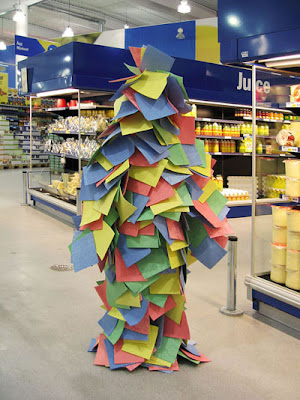
Like it was made out of post-it notes, of course.

Like it was made out of post-it notes, of course.
Matt addresses the issue of the philosophers of Lagado, with regards to Don Norman’s take on the “simplicity” of Google:
“it would be more convenient for all men to carry about them such things as were necessary to express a particular business they are to discourse on”
I refer to it as the “map of the world the size of the world” problem, but I forget where I obtained that concept – it might have been Gulliver, too. The most perfect map of anything is a 1:1 representation of it – you end up making a copy. The trade-off in any navigation aid – menu, sitemap, chart – is accuracy of representation versus accuracy of content (I think). You need a perfect representation – an outline – but you don’t need a perfect rendering of content, because you’ll get that at the destination.
I face this problem a lot in design and IA; you come up with a solution that will work with the current content – and then “current content” grows. And for a while, things scale, but then they stop scaling, and you end up cramming it all in at the top because, well, all the content is competing with one another. And so you end up with a map of the world the size of the world.
The next step is to stop, refactor, and start again – if you have that luxury. Google, by contrast, never let things grow: it’s still practically the same homepage they started with. They avoided the feature-bloat by never letting it happen, and instead, launched their other product by and large, seperately. They may have occasionally integrated them into the results screen, but never the home page. So then usability comes down to intuition (and why shouldn’t it? Even Norman argues that objects should be intuitively usable). mail.google.com – what do you know, it works. maps.google.com – it works. And in making people guess the subdomains, you’re creating better users – users who work out what they’re really looking for quicker. That makes them more adept at your product – because Google’s product is find, after all – and more adept consumers of the internet.
The map-of-the-world problem stems from that horrid, oh-so-web-1.0 site archetype: the portal. We tread a fine line now – at one extreme, a single search box as a gateway to content; at the other, comprehensive indexes and subindexes, homepages of horrendous complexity. I don’t think the “single search box” approach is valid for many, but people are moving that way, and it’s good – away from horrendous taxonomies and indexes and subpages and sitemaps and towards a more organic, find-orientated paradigm.
Don Norman doesn’t believe in find. He likes devices to be “their own instruction manual”, remember – you shouldn’t need to read the book, it should just be obvious. This leads to his crazy telephones with millions of discrete buttons for each function. He’s kind-of right, but he doesn’t like a middle-ground of adaptability, multi-purpose interfaces. Google riles him not because it’s the middle ground in his way of thinking, but the polar opposite.
HG Wells on the ‘World Brain’: “We want… a universal organization and clarification of knowledge and ideas… what I have here called a World Brain, operating by an enhanced educational system through the whole body of mankind… a widespread world intelligence conscious of itself…“. Wells is a real hero of mine; ahead of his time, and yet so perfectly of it. This long quotation, on a global store of knowledge that requires permanent curation, is an interesting find. [via oreilly radar]